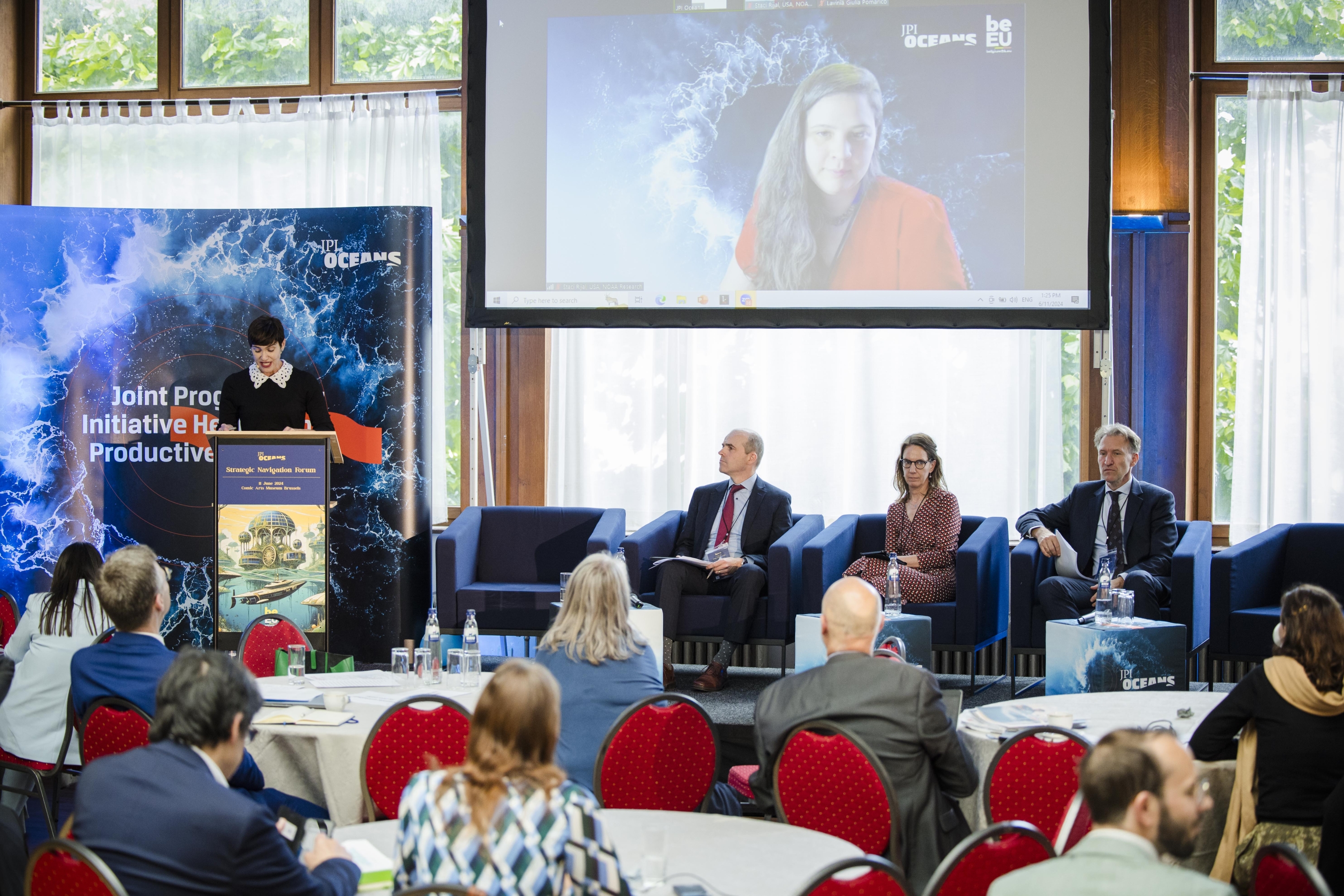It was a day where science and policy converged to anticipate coming ocean challenges and opportunities, all under the whimsical gaze of Tintin, Asterix, Gaston, and even a few Smurfs. The event commenced with a warm welcome from Benjamin Kürten, Vice-Chair of JPI Oceans. He provided a historical overview, tracing JPI Oceans’ journey since its formal establishment in 2011. Benjamin reminded of the establishment of legal status in 2018 and underscored JPI Oceans’ pivotal role in addressing global ocean issues related to pollution, resource use, and climate change through Joint Actions and Strategic Engagements. He particularly underlined JPI Oceans’ role in pursuing innovative “fresh” topics, in which the JPI already set landmarks (MiningImpact, Microplastics, Underwater Noise) and new topics in the making such as changing marine lightscapes, offshore groundwater, and marina infrastructures.
Tintin, perpetually seeking new adventures across diverse countries, would have found plenty at this Forum. The initial sessions featured keynote addresses by esteemed science-policy representatives from JPI Oceans member countries (Belgium, Germany, Ireland, Italy, Malta, Netherlands, Norway and Portugal), presenting their visions, priorities, and contributions, effectively setting the stage for a day of trans-national and cross-disciplinary forward-thinking discussions.
The event also featured three good examples of JPI Oceans Joint Actions with their recent final deliveries. Bart van den Hurk, IPCC Working Group 2 co-chair, introduced the Assessment Report of the European Knowledge Hub on Sea Level Rise, highlighting the importance of informed policymaking. Donata Canu, Researcher, National Institute of Oceanography and Applied Geophysics, presented the comprehensive handbook of another Knowledge Hub on assessing the cumulative effects of human activities on marine environments. She advocated for standardisation of data and methodologies and demonstrated the concept of tipping points with a bang. Lastly, Thorsten Kiefer, JPI Oceans Director, presented the information portal on munition in the sea, formally launched at the European Maritime Day two weeks earlier.

The Forum continued with a panel discussion addressing marine and maritime matters from a global to an Atlantic and European perspective. The speakers picked up their blue pens to draw future ocean priorities, starting with Alison Clausen, Deputy Coordinator, UN Decade of Ocean Science for Sustainable Development, highlighting the need for globally coordinated science to support a sustainable blue economy and ocean climate solutions. Staci Rijal, Director for Research at the International Activities Office of the National Oceanic and Atmospheric Administration in the US offered an international perspective on pressing Atlantic issues such as ocean observation and coastal resilience, which have been taken up by the All-Atlantic Research and Innovation Alliance. Kestutis Sadauskas, Deputy Director-General of DG MARE at the European Commission, highlighted the key roles of food and renewable energy for the future of the marine and maritime R&I landscape, as well as the evolving panorama of dual-use research with military and civil applications. Niall McDonough, Chair of JPI Oceans, brought forward the role of the countries in ameliorating the use of ocean space, the integration of social sciences, and generally the need to secure funding for ocean research, all while developing ways of informing policymakers more efficiently.

Expert-led discussions followed, with Sheila Heymans Executive Director of the European Marine Board and James Jolliffe, Economist at the Space and Oceans Unit, Organisation for Economic Co-operation and Development. They both shared insights from the recent foresight processes performed by their institutions to feed into the strategic discussions of the Forum. Sheila gave a rundown of the Navigator VI report that systematically identifies key topics at the interfaces between the ocean and people, climate, freshwater and biodiversity. James on the other hand, argued that ocean economics should be considered, too, as it can be a good lever for interaction with policy makers and the public. He stressed how understanding and showcasing the economics of marine data will be instrumental in communicating large-scale initiatives and underpinned it with economic scenarios for the energy transition until mid-century.
And finally, the highly anticipated interactive session unfolded, aimed at gathering insights from participants on key challenges and opportunities in marine and maritime research for the latter half of the decade and possibly beyond. Participants huddled around seven round tables, each group sketching a portfolio of emerging marine topics for JPI Oceans to address in the coming years, including new technologies such as artificial intelligence, sensors and new data platforms, Marine Spatial Planning (MSP), offshore renewables and ocean energy, deep sea mining and land-sea interfaces.
The Forum attendees rummaged through JPI Oceans’ implementation toolbox to seek how good ideas can be drawn up into success stories, and they deliberated on the Knowledge Hubs as some of the most effective JPI Oceans tools, aiming to maximise their potential and to ensure the practical application of their outcomes. Strengthening communication and implementation of research results from Joint Actions, ensuring stakeholder involvement, and consensus-building around common objectives were also key points of discussion. Regarding science-policy cooperation, strategies included facilitating regular meetings between countries to align policies and initiatives, providing policymakers with tangible evidence and tools such as technology demonstrations and policy toolkits to support decision-making, and establishing political structures or groups within parliaments to facilitate the translation of scientific findings into policy. A comprehensive output detailing these discussions will be published shortly. Stay tuned for this report – it promises to be quite the page-turner.

Angelo Camerlenghi, Vice-Chair of JPI Oceans, concluded the session by emphasizing that JPI Oceans will continue indefinitely as long as member countries commit to this trans-national form of collaboration. He stressed the importance of concentrating efforts on filling knowledge gaps, involving the private sector, improving communication, emphasizing strategic approaches and further developing science diplomacy. In a personal note, he called for not forgetting the ‘brown’ ocean, meaning the surface and interior of the seafloor, in addition to merely the water column ‘blue’ ocean. More generally, Camerlenghi praised JPI Oceans' bottom-up scientific approaches and its alignment with national priorities, underscoring the organisation's track record of implementing agendas and impacting decision-making, as indicated throughout the day’s programme.
Download here the presentations from the Strategic Navigation Forum.